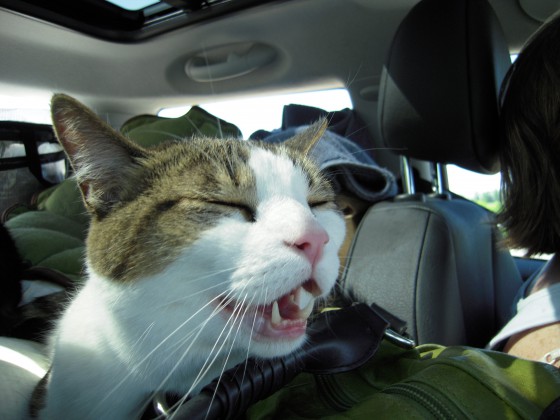One of the most useful stories I've heard from Tara Brach centers on pilot Chuck Yeager losing control of his plane. As she wrote,
In his book The Right Stuff, Tom Wolfe describes how, in the 1950s, a few highly trained pilots were attempting to fly at altitudes higher than had ever been achieved. The first pilots to face this challenge responded by frantically trying to stabilize their planes when they went out of control. They would apply correction after correction, yet, because they were way out of the earth’s atmosphere, the rules of thermodynamics no longer applied, so the planes just went crazy. The more furiously they manipulated the controls, the wilder the rides became. Screaming helplessly to ground control, “What do I do next?!” the pilots would plunge to their deaths.
This tragic drama occurred several times until one of the pilots, Chuck Yeager, inadvertently struck upon a solution. When his plane began to tumble, Yeager was thrown violently around in the cockpit and knocked out. Unconsciously, he plummeted toward Earth. Seven miles later, the plane re-entered the planet’s denser atmosphere, where standard navigation strategies could be implemented. He steadied the craft and landed. In doing so, he had discovered the only life-saving response that was possible in this desperate situation: don’t do anything. Take your hands off the controls.
It’s the exact same way with us. As Wolfe wrote, “It’s the only solution that you had. You take your hands off the controls.”

The Controller is most palpable in my current life in the arena of my adored cat, Chopper. He's been my sidekick for close to 10 years and diagnosed with cancer for 2 of those. He has valiantly endured numerous unpleasant interventions and countless car trips to the veterinarian, which, as the photo above reveals, are not his preferred activity. But the tumors keep returning, again and again. We are at a juncture, Chopper and I, where the treatments no longer seem to be working and he is giving me numerous behavioral cues that he does not want to keep getting pricked with needles and swallow pills that make him feel lousy. To listen to those signals means I need to let go of the controls and, ultimately, to Chopper.
As I've written previously, animals matter intensely to many U.S. pet owners these days, and I am among them. This cat has accompanied me through moves across the country, relationship beginnings and endings, career changes, and other life transitions, and he has always--and I mean always--greeted me with unconditional love and acceptance. His relatively young age and uncomplicated, endess supply of love makes letting go of him more agonizing; the fact that he cannot tell me in English how he feels about his situation spurs a lot of doubt about my decision-making on his behalf. To stop fighting to save him from his cancer is maddeningly sad and terrifying, as the unknown future may hold physical suffering and deterioration from which I want to protect him and, honestly, do not want to witness. I therefore am grateful for Brach's gentle reminders that staying present to our own and others' lives, even when they include seemingly unendurable pain, opens us to the vastness of love.
In her book True Refuge, Brach tells another story that allowed me to see more clearly the possibilities engendered by presence on journeys of illness and loss. In this narrative, Pam's husband Jerry was dying from lymphoma after a three-year battle against it. Pam was doing everything in her power to keep him alive, and Brach gave her permission to let go of the controls:
"It sounds like you've been trying really hard to take good care of Jerry...and it's been very busy," she said to Pam. "You've already done so much...but the time for all that kind of activity is over. At this point, you don't have to make anything happen, you don't need to do anything...Just be with him. Let him know your love through the fullness of your presence...In those most difficult moments...you might pause and recognize what you are feeling--the fear or anger or grief--and then inwardly whisper the phrase 'I consent'...All you can do is have the intention to pause, the intention to feel what is going on and 'let be.'"
Pam listened to Brach's advice and called her a month later to let her know that Jerry had died. She also relayed,
"Over those last few weeks I had to keep letting go of all my ideas of how his dying should be and what else I should be doing, and just remind myself to say 'I consent.' At first I was mechanically repeating the words, but after a few days I felt as if my heart actually started consenting...When all of me was truly consenting to the fear and pain, I knew how to take care of him. I sensed when to whisper words of encouragement or just listen, ways to reassure him with touch...how to sing to him, be quiet with him. How to be with him."
This beautiful story unveils the power and strength of saying yes to our experiences and being with whatever arises. I now understand that if I pay attention to Chopper--really pay attention--I will know what to do, without needing to control the situation. In other words, I can trust the actions that emerged from the intention to be with him through whatever arises. Pam's story also gives me an aspiration for the time I have left not only with my beloved cat but also the other living beings gracing my life. As she said about her final days with Jerry, "In the silence I could see past a sense of 'him' and 'me.' It became clear that we were a field of loving--total openness, warmth, light. He's gone, but that field of loving is always with me. My heart knows that I came home...truly I came home to love."
